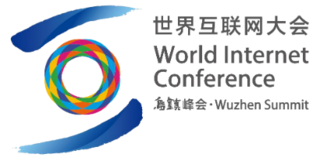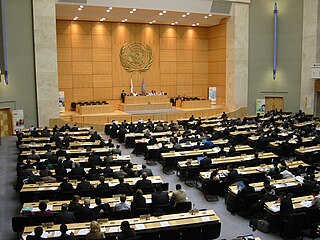 W
WInternet governance is the development and application of shared principles, norms, rules, decision-making procedures, and programs that shape the evolution and use of the Internet. This article describes how the Internet was and is currently governed, some of the controversies that occurred along the way, and the ongoing debates about how the Internet should or should not be governed in the future.
 W
WThe bill H.R. 1580 (long title: "To affirm the policy of the United States regarding Internet governance") was a bill introduced into the United States House of Representatives in the 113th United States Congress. The bill primarily listed a series of Congressional "findings" regarding the internet, its use, and the way it has been governed. Finally, the bill affirms that "it is the policy of the United States to preserve and advance the successful multistakeholder model that governs the Internet."
 W
WA digital citizen is a person using information technology (IT) in order to engage in society, politics, and government. As defined by Karen Mossberger, one of the authors of Digital Citizenship: The Internet, Society, and Participation, digital citizens are "those who use the internet regularly and effectively." They also have a comprehensive understanding of digital citizenship, which is the appropriate and responsible behavior when using technology. Since digital citizenship evaluates the quality of an individual's response to membership in a digital community, it often requires the participation of all community members, both visible and those who are less visible. A large part in being a responsible digital citizen encompasses digital literacy, etiquette, online safety, and an acknowledgement of private versus public information.
 W
WThe E-G8 Forum was an invitation-only summit of leaders in government and industry focusing on the Internet in the context of global public policy. The event was put on by Publicis Groupe and was convened by French President Nicolas Sarkozy from May 24-25th 2011, prior to the 37th G8 summit, and was held at the Tuileries Garden in Paris.
 W
WThe Latin America and Caribbean Federation for Internet and Electronic Commerce, eCOMLAC was founded in March 1988 at a meeting held in Río de Janeiro.
 W
WAnriette Esterhuysen is a human rights defender and computer networking pioneer from South Africa. She has pioneered the use of Internet and Communications Technologies (ICTs) to promote social justice in South Africa and throughout the world, focusing on affordable internet access. She has been the Executive Director of the Association for Progressive Communications since 2000 until April 2017, when she became APC's Director of Policy and Strategy. In November 2019 United Nations Secretary-General António Guterres appointed Anriette Esterhuysen as the new Chair of the Internet Governance Forum’s Multistakeholder Advisory Group.
 W
WThe history of the Internet has its origin in the efforts to build and interconnect computer networks that arose from research and development in the United States and involved international collaboration, particularly with researchers in the United Kingdom and France.
 W
WHuman rights applied to encryption is an important concept for freedom of expression as encryption is a technical resource of implementation of basic human rights.
 W
WThe Internet Research Agency, also known as Glavset and known in Russian Internet slang as the Trolls from Olgino, is a Russian company engaged in online influence operations on behalf of Russian business and political interests. It is linked to Russian oligarch Yevgeny Prigozhin and based in Saint Petersburg, Russia.
 W
WA regional Internet registry (RIR) is an organization that manages the allocation and registration of Internet number resources within a region of the world. Internet number resources include IP addresses and autonomous system (AS) numbers.
 W
WThe pathetic dot theory or the New Chicago School theory was introduced by Lawrence Lessig in a 1998 article and popularized in his 1999 book, Code and Other Laws of Cyberspace. It is a socioeconomic theory of regulation. It discusses how lives of individuals are regulated by four forces: the law, social norms, the market, and architecture.
 W
WA regional Internet registry (RIR) is an organization that manages the allocation and registration of Internet number resources within a region of the world. Internet number resources include IP addresses and autonomous system (AS) numbers.
 W
WThe Trademark Clearinghouse is a database of validated and registered trademarks established by ICANN to assist trademark holders prevent infringing behavior in the Domain Name System. In combination with the Uniform Rapid Suspension System (URS), it is the second significant attempt by ICANN to handle the "Trademark Dilemma". The first attempt was the Uniform Domain-Name Dispute-Resolution Policy.
 W
WWho Controls the Internet? Illusions of a Borderless World is a 2006 book by Jack Goldsmith and Tim Wu that offers an assessment of the struggle to control the Internet. Starting with a discussion of the early vision of a borderless global community, the authors present some of the most prominent individuals, ideas and movements that have played key roles in developing the Internet. As law professors at Harvard and Columbia, respectively, Goldsmith and Wu assert the important role of government in maintaining Internet law and order while debunking the claims of techno-utopianism that have been espoused by theorists such as Thomas Friedman.
 W
WThe World Internet Conference, also known as the Wuzhen Summit, is an annual international event, first held in 2014, organized by government agencies in China to discuss global Internet issues and policies.
 W
WThe World Summit on the Information Society (WSIS) was a two-phase United Nations-sponsored summit on information, communication and, in broad terms, the information society that took place in 2003 in Geneva and in 2005 in Tunis. One of its chief aims was to bridge the global digital divide separating rich countries from poor countries by spreading access to the Internet in the developing world. The conferences established 17 May as World Information Society Day.
 W
WThe ZA Central Registry (ZACR), formerly known as UniForum SA, is a non-profit organisation established in 1988 and operates various second-level domains (SLD's) in South Africa. The ZA Central Registry is the administrator of the South African zones such as "co.za" and "web.za". Their offices are based in Midrand, South Africa.
 W
W.ZADNA is a not-for-profit company that administrates the .za namespace. The .za Domain Name Authority (.ZADNA is statutory regulator and manager of .ZA. .za is the Internet country code top-level domain for South Africa. .ZADNA is an agency of South African government under the Department of Telecommunications and Postal Services. ZADNA is the registry of the South Africa ccTLD.